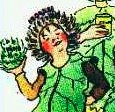An Early Thought On Michael Pollan's Book The Omnivore's Dilemma:

A couple days ago I received a welcomed phone call from the library informing me that the book I had requested awhile ago, The Omnivore's Dilemma, had finally come in. I actually had forgotten I had even put it on hold. I have just started it, but it is already a fascinating read.
The author divides the book into four different food chains or meals that may reach our plate; the industrial fast-food meal, an "industrial-type" organic meal, a local organic meal, and a foraged/hunted meal. Currently I am still in the conventional industrial section.
What has really interested me thus far, (although I'm not overtaken with surprise) is the reliance of the industrial food system on corn, which is heavily reliant on chemical fertilizers and fossil fuels. According to the book, one-fourth of all items in a typical grocery store contain or was processed with corn. Many foods, like a chicken nugget, contains corn upon corn. The chicken was fed corn. There is cornstarch to hold it together, corn flour on the batter, and corn oil for frying it. It also contains leavinings, lecithin, glycerides, and citric acid-all derived from corn. Wow. Now I know why there was corn in every field where I grew up in Illinois.
One problem with corn is the amount of nitrogen that it needs to grow. Of coarse the industrial corn producers use chemical fertilizers, which end up in the wells. To this day the well at my Mother's house where I grew up has nitrate levels so high children and pregnant women aren't supposed to drink the water from it. Needless to say I bring my own artesian water.
Another huge problem is the amount of fossil fuels needed to produce industrial corn. Pollan brings up an eye-opening statistic. Because of the amount of fuel needed to create the fertilizers and pesticides, drive the tractors, and transport the corn, more than one calorie of fossil fuel energy is needed for every calorie of food produced. It doesn't take much to see that this process isn't very sustainable. Or as Pollan states it "too bad we can't simply drink the petroleum directly".
To keep this from becoming a book review, I would jsimply like to recommend this book to anyone who hasn't read it, or like myself, hasn't finished it. Perhaps I will do another post on the book in the future if it's a topic I feel like discussing.
Labels: Books, Corporations, Local Foods, Our Fat Society


8 Comments:
I'm just in the middle of reading it too and am really enjoying it. Our society's dependence on corn is mind boggling!
I'd love to hear your thoughts on the rest of the book.
Please, keep us posted. I hadn't given much thought to the amount and repercussions of corn in our diets. Nor of it being an effect of industrialization. Corn doesn't fair well in Alaska...so the corn-effect up here has the additions of transport and reliance. I'd like to know more. Thanks.
I think you will enjoy it to the end. It may piss you off, too. He grapples with many issues and his ambivalence to many things is palpable. What helps is he is a great writer. If you get a chance, check out The Botany of Desire, for you will surely look at apples and potatoes differently!
Sounds interesting...
I need to find more time for books.
I am reading this right now too! A great and thought provoking read. Confirms my dread?! Congrats on the baby-on-the-way and good luck!
I want to read this -- it is on my list, but a little further off. It explains all of the dorn fields around here!
I look forward to hearing more about this book.
An amazing book, from what I've heard (ahem). So been meaning to get it and read it: seen excerpts in lots of mags. Good inspiration to get going on my book reading.
Cheryl: I'm reading it pretty slow because I'm also reading Middlesex, but I will keep posting. I'd also love to hear yor comments.
The fool: Corn really is everywhere in US diet. They have to get rid of it somewhere.
el: I'm curious how it will end. I will check out his other book if I continue to enjoy this one.
crall: I do recommend it. I hope you find the time.
stacie: Thanks. It is dreadful.
emme: The corn thing is huge. Most of the corn is used for HFCS, food additives, and animal feed. The corn in other food doesn't even come from all of the field corn one sees in IL, IA, and MN.
gtr: It is a good read. Right up there with Fast Food Nation.
Post a Comment
<< Home